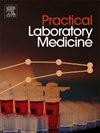新型Dymind全自动血液学分析仪的性能评估
IF 1.3
Q3 MEDICAL LABORATORY TECHNOLOGY
引用次数: 0
摘要
Dymind全自动血液学分析仪包括五部分分析仪DF55和DH76以及六部分分析仪DH615,其特点是网状红细胞参数和人工智能驱动的分析技术。本研究评估了这些分析仪在评估精度和进行方法比较方面的性能,以确定Dymind自动化系统的诊断准确性和临床疗效。方法通过分析Dymind DF55、DH76和DH615的全血细胞计数(CBC)和白细胞计数(WBC)差异数据,评估准确性并进行方法比较。将结果与Sysmex XN-3000分析仪进行比较。结果dymind系列分析仪对所有CBC和WBC差异参数均具有较高的运行间精度。方法比较显示,除了平均红细胞血红蛋白浓度和嗜碱性粒细胞计数外,Dymind和Sysmex分析仪在大多数CBC参数上具有很强的相关性(r = 0.80-0.99)。结论dymind系列分析仪在所有标准CBC和WBC差异计数参数中表现出很强的分析性能,验证了其精确性和与常规血液检测参考系统的可比性。本文章由计算机程序翻译,如有差异,请以英文原文为准。

Performance evaluation of the new Dymind automated hematology analyzer
Introduction
The Dymind automated hematology analyzer includes the five-part analyzers DF55 and DH76 and the six-part analyzer DH615, which features reticulocyte parameters and an artificial intelligence-driven analysis technology. This study evaluated the performance of these analyzers in assessing precision and conducting method comparisons to determine the diagnostic accuracy and clinical efficacy of the Dymind automated system.
Methods
We assessed precision and conducted a method comparison by analyzing complete blood count (CBC) and white blood cell (WBC) differential data from the Dymind DF55, DH76, and DH615. Results were compared with those from the Sysmex XN-3000 analyzer.
Results
The Dymind-series analyzers demonstrated high between-run precision for all CBC and WBC differential parameters. Method comparison revealed a strong correlation (r = 0.80–0.99) between the Dymind and Sysmex analyzers for most CBC parameters, except for mean corpuscular hemoglobin concentration and basophil counts.
Conclusions
The Dymind-series analyzer exhibited a strong analytical performance across all standard CBC and WBC differential count parameters, validating their precision and comparability with a reference system for routine hematological testing.
求助全文
通过发布文献求助,成功后即可免费获取论文全文。
去求助
来源期刊

Practical Laboratory Medicine
Health Professions-Radiological and Ultrasound Technology
CiteScore
3.50
自引率
0.00%
发文量
40
审稿时长
7 weeks
期刊介绍:
Practical Laboratory Medicine is a high-quality, peer-reviewed, international open-access journal publishing original research, new methods and critical evaluations, case reports and short papers in the fields of clinical chemistry and laboratory medicine. The objective of the journal is to provide practical information of immediate relevance to workers in clinical laboratories. The primary scope of the journal covers clinical chemistry, hematology, molecular biology and genetics relevant to laboratory medicine, microbiology, immunology, therapeutic drug monitoring and toxicology, laboratory management and informatics. We welcome papers which describe critical evaluations of biomarkers and their role in the diagnosis and treatment of clinically significant disease, validation of commercial and in-house IVD methods, method comparisons, interference reports, the development of new reagents and reference materials, reference range studies and regulatory compliance reports. Manuscripts describing the development of new methods applicable to laboratory medicine (including point-of-care testing) are particularly encouraged, even if preliminary or small scale.
 求助内容:
求助内容: 应助结果提醒方式:
应助结果提醒方式:


